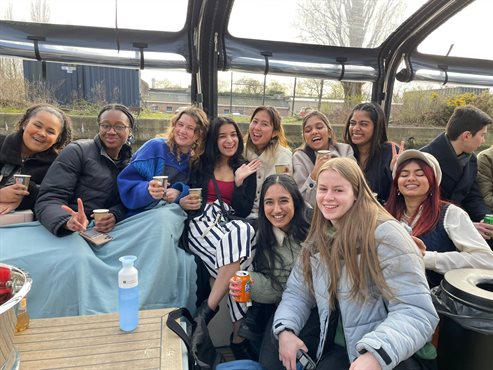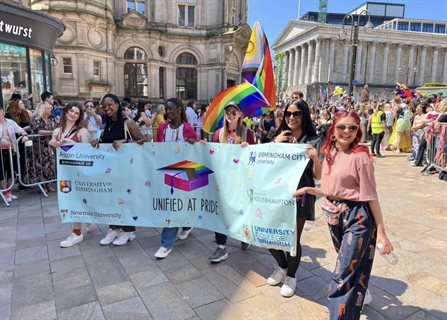Blog: Preparing for University as a disabled student
Written by Olivia Bailey
Hey, I’m Olivia, a third-year Psychology student and one of the Equality, Diversity, and Inclusion Student Ambassadors (EDISAs) here at UoB. Starting university can be daunting and being disabled can mean there are more challenges to navigate through. It’s tough and there may be times you have to advocate for your needs, but you’re not alone. There’s support available to help you succeed.

Drawing on my own personal experience of being a disabled student, here’s some useful advice on how to prepare for a smooth university Welcome.
Contact UoB’s Student Disability Service
If you’re starting UoB with a disability, I recommend you register with The Student Disability Service as early as possible so support can be put in place (you’ll need to disclose medical evidence). I chose to disclose my disability on my UCAS application and had contact with the service over the summer, which meant all my reasonable adjustments were in place for the start of term.
A Reasonable Adjustment Plan (RAP) details the adjustments and support the university will offer and implement for you, depending on your individual needs. This could include things like extra time and rest breaks in exams, access to extensions for coursework, alternative means of completing group work, research adaptations, accessible teaching rooms and adjustments and prioritisation for accessible accommodation.
Some of the key adjustments I have as part of my RAP include 25% extra time in my exams, easy access to extensions for coursework, and adapted accommodation that meets my needs. I wouldn’t have been able to adapt to university life and study successfully without these adjustments.
Applying for Disabled Students Allowance (DSA)
Disabled Students Allowance (DSA) provides financial support to cover costs you may incur while studying with a disability. This can include specialist equipment and software, non-medical helpers for mentoring or note taking etc, travel costs, and other general costs such as printing. You can apply for DSA through student finance, and you’ll have a needs assessment to determine what they can support you with as it depends on your individual circumstances.
This useful guide from Disability Rights UK is worth reading before applying. The Student Disability Service also provide information on DSA and can support and advise you with your application.
Through the DSA, I was given specialist equipment and software, which included screen reading, voice dictation and mind mapping software, noise-cancelling headphones, and a printer. These resources have really helped me with the aspects of studying I find difficult because of my disability.
I also receive specialist mentoring and study skills support funded by DSA. I’ve found it useful to have somebody to help me navigate my studies, helping me with things like revision strategies, managing anxiety, organisational skills, making friends and time management. I recommend applying for DSA as you can receive personalised support that’ll help you successfully carry out your studies.
Accessibility and navigating around campus:
Get familiar with your new environment before you arrive. In terms of accessibility on campus, there are several useful resources that’ll help you navigate your way around – campus map app, mobility map, and AccessAble guides.
Information on accessible and inclusive facilities on campus can be found on the campus facilities page. If you encounter any kind of accessibility issues, you can report these to the relevant teams who’ll do their best to resolve the issues.
Being part of an inclusive environment
UoB has a dedicated Student EDI team who work on a variety of EDI initiatives to promote an inclusive campus culture. The team includes Equality, Diversity and Inclusion Student Ambassadors (EDISAs) who are recruited each year to use their lived experiences to work on improving equality and improve the experiences of minority groups.
I worked as an EDISA throughout my second year, and it’s been a massive highlight of my studies. I found a community of like-minded students who are passionate about inclusion like I am. I’ve been involved in disability specific initiatives, such as the Disabled Students Contribution Group and Disability History Month, but also wider initiatives. If EDI is something you are passionate about, look out for ways you can get involved including joining the Disabled Student Contribution Group.

The Guild of Students also have several societies and volunteering groups relating to health conditions, mental health, and disabilities which you can join including the Disability and Mental Health Students Association (DAMSA).
Having a disability shouldn’t stop you from having a good student experience. I hope this blog helps and remember there’s always support available.
Discover our full range of student support on our Welcome wellbeing page.